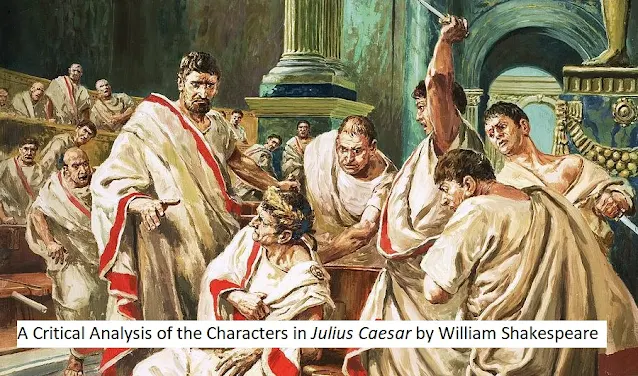A Critical Analysis of the Characters in Julius Caesar by William Shakespeare
🖋️ Introduction
Julius Caesar by Shakespeare is more than just a historical tragedy; it's a profound examination of human loyalty, ambition, and moral ambiguity. Despite being titled after Julius Caesar, the play's central themes are those who either feared, loved, or attempted to control his legacy. The conflicting tensions between power and principle and public duty and private conscience are explored by Shakespeare through his vividly rendered characters, including Brutus, Cassius, Mark Antony, and Caesar himself.
🔱 1. Julius Caesar: The Shadow of Power
Caesar only shows up in a few scenes, but his impact is felt throughout the play. His tragic flaw is hubris, or the conviction that he is invincible, despite his ambition, power, and reverence.
“I am constant as the Northern Star.” (Act 3, Scene 1)
Caesar's pride prevents him from seeing Artemidorus's letter, Calpurnia's dreams, and the soothsayer's warnings. Ironically, his death is planned by those closest to him, even though he has no fears. Caesar gains more power in death than he did in life because his legacy fuels civil war and determines Rome's political destiny.
⚖️ 2. Marcus Brutus: The Tragic Idealist
Brutus is the play's real tragic hero. He feels that killing Caesar is a noble deed to stop tyranny, so he chooses to be loyal to the Roman Republic despite his love for Caesar.
“Not that I loved Caesar less, but that I loved Rome more.” (Act 3, Scene 2)
Although Brutus is led by moral reasoning and stoic principles, his naivete ultimately proves to be his undoing. He lets Antony speak at Caesar's funeral, undervalues Mark Antony, and declines to kill him alongside Caesar. His downfall is caused by these choices. Despite being a man of honor, Brutus is oblivious to political reality due to his inflexible idealism.
🐍 3. Cassius: The Master Manipulator
Cassius is the one who started the plot, motivated more by jealousy and apprehension about Caesar's increasing authority than by a sincere concern for Rome.
“The fault, dear Brutus, is not in our stars,
But in ourselves, that we are underlings.” (Act 1, Scene 2)
He is cunning, convincing, and manipulative. His strategies involve appealing to Brutus' pride and forging letters to influence him. But Cassius is also emotionally nuanced; he genuinely cares for Brutus and displays vulnerable moments, particularly prior to his passing. His tragically poor decision to commit suicide in Act 5 after concluding that Brutus had been vanquished is revealed.
🦁 4. Mark Antony: The Orator and Strategist
It becomes clear that Mark Antony is a master of political scheming and rhetoric. Antony's funeral speech turns public opinion against the conspirators, who initially underestimated him.
“Friends, Romans, countrymen, lend me your ears...” (Act 3, Scene 2)
Antony causes a mob riot and changes the balance of power by using irony, repetition, and emotional appeal. Despite his seeming allegiance to Caesar, he demonstrates his brutal political acumen in Act 4, where he plans the proscription of enemies. The character of Antony serves as an example of how language and manipulation can influence history.
🐦 5. Portia and Calpurnia: Ignored Voices
Portia and Calpurnia, despite their minor roles, capture the emotional undertones of the world dominated by men.
-
Brutus's wife, Portia, is a devoted and intelligent woman. She demonstrates her strength and emotional intelligence by pleading with Brutus to divulge his secrets. Her ultimate suicide reflects the moral weight of Brutus.
-
Caesar's wife, Calpurnia, foretells Caesar's demise in her dreams. But Caesar ignores her, putting his reputation before prudence. The feminine wisdom and intuition that the male political world disregards are symbolized by her character.
⚔️ 6. The Roman Crowd: unpredictable and dangerous
Roman citizens are a representation of mass psychology since they are susceptible to being influenced by persuasive speakers. At Caesar's funeral, they start rioting in Caesar's honor after Antony influences them to stop applauding Brutus.
Shakespeare's caution against demagoguery and the erratic nature of public opinion in a precarious democracy is brilliantly illustrated by this mob mentality.
🧵 Conclusion
Shakespeare's Julius Caesar thrives on the characters' nuanced emotional and moral complexity rather than just action. The tragic tapestry of loyalty, betrayal, and lost republics is woven by the pride of Caesar, the idealism of Brutus, the guile of Cassius, and the eloquence of Antony. Julius Caesar is not only a Roman tragedy but also a timeless examination of political power and human nature because every character is torn between their personal beliefs and their public obligations.
[Tags: Shakespeare Tragedy, Julius Caesar Analysis, Brutus and Cassius, Shakespeare Characters, Power and Morality in Literature]




Comments
Post a Comment